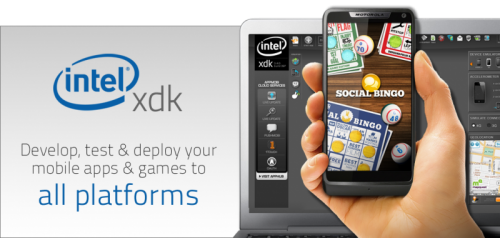Creating mobile applications for multiple platforms can become a bothersome task if one attempts it without implementing an appropriate framework.
No doubt, there are numerous technologies available in the market that help develop mobile applications. But, only a few of them have made a breakthrough to amazingly pull the mutually incompatible mobile platforms together, like HTML does. As, HTML5 offers a reliable and proficient way to deliver robust solutions to mobile developers, it is the most viable choice for the majority of the developers and users.
There are several upsides of developing an HTML5 app instead of a native application. Here are some.
- It offers offline support.
- It makes the app content easily visible to search engines.
- With this approach, you can target multiple mobile devices and platforms.
- It is not app store dependent.
- Relatively, it is easier to launch and support the application.
- The app development cost is less and the process is relatively faster.
Like, every day is followed by night, HTML5 apps have some downsides as well.
- It is hard to make an app easily visible to the potential audience, as no app store support is there.
- It offers limited access to the native functions of a device.
- Offline storage is not a secure option.
- It can deliver slower performance than a native app.
You can easily find a slew of options of good mobile web frameworks. These frameworks differ from each other in terms of workflow logic, browser compatibility, performance, dependencies and so forth. Like this, there are several things that make it complicated to streamline the choice for the best suitable HTML5 framework.
In this article, we will provide you an insight into a few of the outstanding HTML5 mobile app frameworks that are real gems in the mobile development industry. Let’s explore them.
1. jQuery Mobile
 There is no need to develop an individual app or website for targeting multiple mobile platforms and devices, jQuery Mobile framework facilitates one to quickly create a fantastic mobile application or site that will run smoothly on any device. This free open source platform is one of the old frameworks that has dramatically improved to cater to the advanced market demands.
There is no need to develop an individual app or website for targeting multiple mobile platforms and devices, jQuery Mobile framework facilitates one to quickly create a fantastic mobile application or site that will run smoothly on any device. This free open source platform is one of the old frameworks that has dramatically improved to cater to the advanced market demands.
Benefits:
- The framework is absolutely free and easy to deploy.
- You can efficiently use the drag and drop UI builder for developing a requisite app.
- It ensures the compatibility of apps with almost all devices and delivers touch-optimized mobile solutions.
- It also includes a plethora of third-party plugins.
2. Sencha Touch
 Designed to deliver top notch UX, this HTML5 framework augments hybrid app development that can smoothly run over multiple mobile platforms like iOS, Blackberry, Windows mobile, Android, and more. It is a complete package that incorporates framework, UI (user interface) and MVC (Model-View-Controller) system.
Designed to deliver top notch UX, this HTML5 framework augments hybrid app development that can smoothly run over multiple mobile platforms like iOS, Blackberry, Windows mobile, Android, and more. It is a complete package that incorporates framework, UI (user interface) and MVC (Model-View-Controller) system.
Benefits:
- Helps agile mobile app development.
- With the best SVG support, it makes a great choice for mobile apps.
- Supports native look and feel depending upon the mobile platform.
- Easy-to-read and legible documentation, you can easily understand the framework.
3. Ionic
 Developed using SASS, Ionic is a brilliant framework that comes complete with a list of UI components. These components help generate interactive and intuitive applications. The powerful AngularJS, a JavaScript MVVM framework, empowers the Ionic to manage bidirectional data binding and seamless interaction with back-end services and APIs.
Developed using SASS, Ionic is a brilliant framework that comes complete with a list of UI components. These components help generate interactive and intuitive applications. The powerful AngularJS, a JavaScript MVVM framework, empowers the Ionic to manage bidirectional data binding and seamless interaction with back-end services and APIs.
Benefits:
- The framework is open source in nature and available for free.
- Supports the most popular mobile platforms, including iOS and Android.
- Developed around the sophisticated platform, Angular.
- Offers an overwhelming list of 500 custom font icons MIT licensed.
4. Intel XDK
 This fabulous cross platform application development framework is developed by Intel. You just need to download the app on your system and it will offer you a list of templates to get started. The framework also offers a live preview to guide you throughout the development process and allows access to numerous resourceful tools.
This fabulous cross platform application development framework is developed by Intel. You just need to download the app on your system and it will offer you a list of templates to get started. The framework also offers a live preview to guide you throughout the development process and allows access to numerous resourceful tools.
Benefits:
- Easy to use with simple drag and drop approach.
- Comprehensive guides and tutorials are available to efficiently get started.
- Supports numerous UI frameworks, including jQuery Mobile, Twitter Bootstrap, and more.
- Available for free; can be used on Linux, Mac and Windows.
5. Kendo UI
 This is yet another amazing HTML5 framework that augments cross platform mobile app development. Featuring the jQuery widgets, the Kendo UI is primarily based on jQuery. And since, most of the developers are familiar with the popular jQuery, this framework is quite easy to learn and operate.
This is yet another amazing HTML5 framework that augments cross platform mobile app development. Featuring the jQuery widgets, the Kendo UI is primarily based on jQuery. And since, most of the developers are familiar with the popular jQuery, this framework is quite easy to learn and operate.
Benefits:
- Most of its toolset and JavaScript framework are open source in nature; however, a few of the widgets come complete with commercial license.
- It has a small learning curve.
- Numerous tutorials and guides are available to get started.
- Reliable and rapid customer support is available.
- Generates native look and feel on the basis of the targeted mobile device.
Final Thought
The aforementioned frameworks are the most promising mobile app development frameworks that allow one to efficiently target multiple platforms. You can choose any one and develop a remarkable mobile presence.
Author Bio: Juana Steves is a web application developer by profession and a writer by hobby and works for Xicom Technologies, a leading PHP development company. She loves sharing technical information regarding Java, Android, PHP development tips & tricks. If you are looking forward to hire php developer then just get in touch with her.

Mobile Angular UI is also another popular and useful HTML 5 mobile framework which help
you to build HTML 5 mobile apps with Bootstrap and Angular JS.